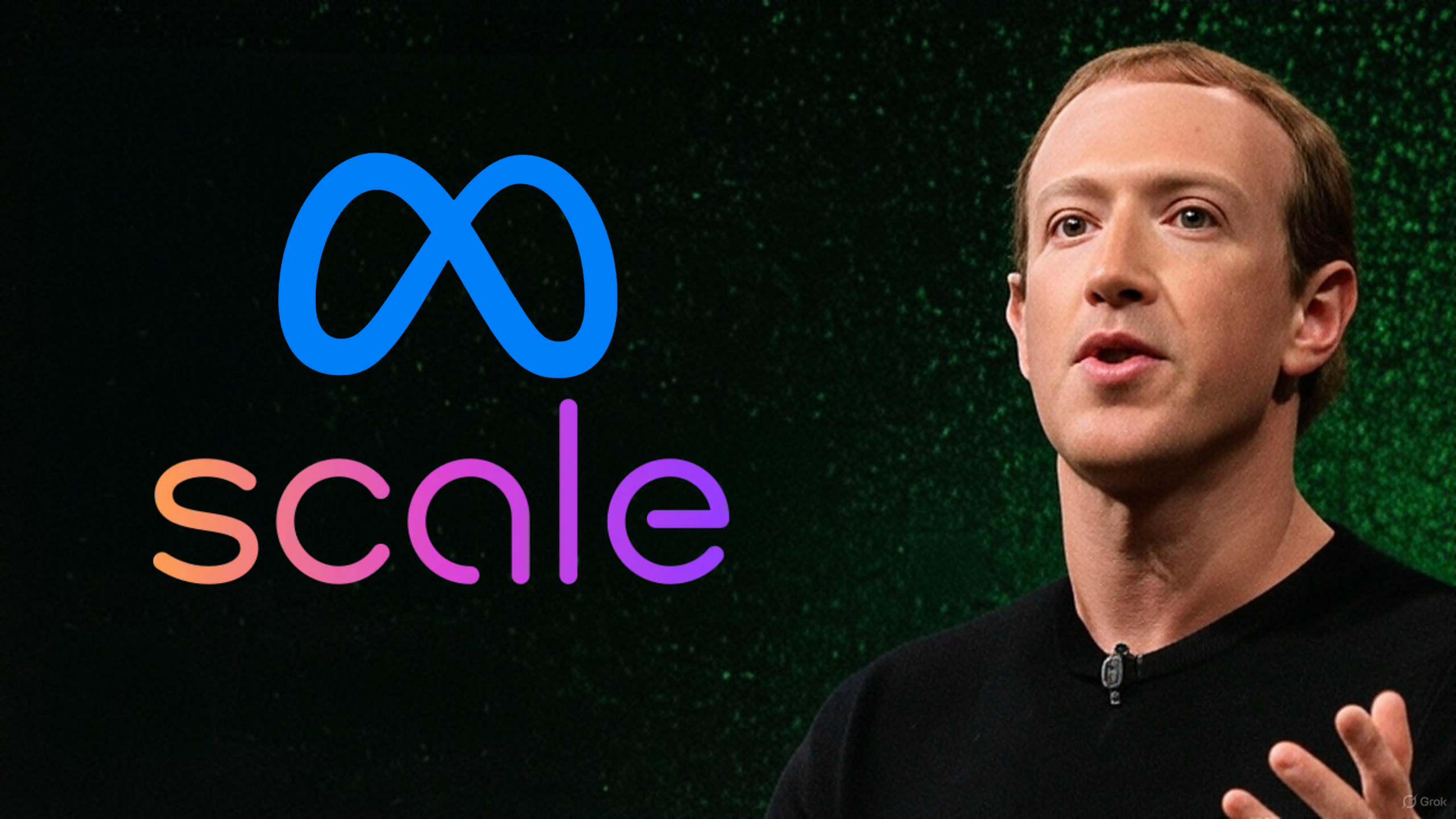 Zuckerberg Goes All-In on AI
Zuckerberg Goes All-In on AI
 Zuckerberg Goes All-In on AI
Zuckerberg Goes All-In on AI

As Meta pivots from social dominance to AI infrastructure, investors must ask: is this a visionary leap or a high-stakes gamble?
Meta is making its biggest bet yet on artificial intelligence. With a nearly $15 billion commitment to Scale AI, the company is doubling down on infrastructure, research, and partnerships that aim to accelerate its pursuit of superintelligence. The move signals a bold new chapter for Meta, one that could reshape its investment profile and its place in the AI arms race.
For retail investors, this is more than a headline. It is a high-risk, high-reward strategic pivot that may influence everything from future earnings to Meta’s competitive edge across consumer, enterprise, and metaverse platforms. Understanding the scale and intent of this deal is crucial for evaluating Meta's long-term value.
Meta + Scale AI: A $15 Billion Power Move
Meta is reportedly investing close to $15 billion for a 49% stake in Scale AI, one of the fastest-growing players in the foundation model space. This minority ownership gives Meta priority access to cutting-edge AI datasets, infrastructure services, and model training capacity, key ingredients for building advanced systems that can rival OpenAI and Anthropic.
CEO Mark Zuckerberg described the move as Meta’s “boldest AI investment to date,” underlining a shift from experimental labs to real-time enterprise integration. Unlike prior Meta AI efforts that struggled with delivery or monetization, this Scale AI deal positions Meta to influence the next generation of large language models and intelligent systems.
The partnership also hints at ambitions beyond social media. Superintelligence research, advanced data annotation, and custom model development point to potential expansion into healthcare, productivity, and autonomous systems—new verticals that could open meaningful revenue streams.
Strategic Implication: From Social to Superintelligence
Meta’s pivot toward foundational AI shifts the narrative from user engagement metrics to infrastructure scale. With Facebook and Instagram reaching maturity, and Threads and the metaverse delivering mixed results, this AI commitment resets Meta's growth thesis. It now reads more like a deep-tech bet than a social media strategy.
The question for investors is whether Meta can turn this technical leap into financial performance. Partnerships with Scale AI may offer efficiency, but the costs are significant, and monetization timelines remain unclear. Unlike Google’s AI-first rebrand or Microsoft’s Copilot-driven SaaS expansion, Meta is betting big on backend scale, less visible, but potentially more transformative if executed well.
Competitive Landscape: Meta Breaks from the Pack
In the AI race, every tech giant is maneuvering for advantage. Microsoft (NASDAQ: MSFT) is leveraging OpenAI to embed Copilot across Office and Azure. Alphabet (NASDAQ: GOOGL) is rolling out Gemini across its search, ads, and cloud platforms. NVIDIA (NASDAQ: NVDA) continues to dominate infrastructure through its GPUs.
Meta’s deal with Scale AI breaks this mold. Rather than partnering with an external AI lab, Meta is embedding itself inside one. This deeper entanglement could yield better training efficiency, proprietary data advantages, and lower latency for large model deployment. But it also concentrates risk, especially if regulatory or technical setbacks emerge.
Investor Considerations: What to Watch Next
With Meta reshaping its AI strategy, retail investors should track several key metrics over the next few quarters:
- Revenue impact from AI-enhanced ad targeting and content moderation tools
- Expansion of developer and enterprise AI offerings through Scale AI integration
- CapEx guidance tied to model training and data center investments
- Progress updates on in-house AI model benchmarks and open-source releases
- Any regulatory commentary around Scale AI or AI safety research partnerships
While this investment may not yield near-term profit spikes, it reinforces Meta's longer-term intent to lead in core AI infrastructure. That could support future applications from metaverse navigation to AI assistants embedded across its family of apps.
Final Word: Meta’s AI Future Hinges on Execution
Meta’s $15 billion stake in Scale AI represents one of the most ambitious private AI investments in history. It is a clear signal that Zuckerberg is positioning the company for relevance beyond social media, anchoring Meta in the infrastructure and intelligence layers of the next tech cycle.
For investors, the risk profile is rising, but so is the potential upside. Meta is no longer a pure social stock. It is becoming an AI infrastructure player with deep tech exposure. That demands a shift in how portfolios categorize Meta and how retail shareholders manage expectations.
For deeper analysis of Meta’s AI trajectory, valuation risks, and competitive edge, explore the full MoneyIQ investment report: Full Meta Report
Take control of your financial future with MoneyIQ. Track your net worth in real-time, gain AI-powered insights, and make smarter financial decisions. Get started today and take the first step toward financial freedom.
Disclaimer
This article is for informational purposes only and should not be considered financial advice. Always conduct your own research and consult with a qualified financial advisor before making any investment decisions.
MoneyIQ Team
 X
X